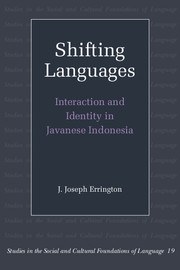Book contents
- Frontmatter
- Contents
- List of figures, maps, and tables
- Acknowledgements
- Preface: suggestions for use
- Note on orthography and transcription
- Map 1 The Indonesian archipelago
- Map 2 Eastern Central Java
- 1 Introduction
- 2 A city, two hamlets, and the state
- 3 Speech styles, hierarchy, and community
- 4 National development, national language
- 5 Public language and authority
- 6 Interactional and referential identities
- 7 Language contact and language salad
- 8 Speech modeling
- 9 Shifting styles and modeling thought
- 10 Javanese–Indonesian code switching
- 11 Shifting perspectives
- Notes
- Works cited
- Index of javanese and indonesian words
- General index
- Titles in the series
3 - Speech styles, hierarchy, and community
Published online by Cambridge University Press: 01 June 2011
- Frontmatter
- Contents
- List of figures, maps, and tables
- Acknowledgements
- Preface: suggestions for use
- Note on orthography and transcription
- Map 1 The Indonesian archipelago
- Map 2 Eastern Central Java
- 1 Introduction
- 2 A city, two hamlets, and the state
- 3 Speech styles, hierarchy, and community
- 4 National development, national language
- 5 Public language and authority
- 6 Interactional and referential identities
- 7 Language contact and language salad
- 8 Speech modeling
- 9 Shifting styles and modeling thought
- 10 Javanese–Indonesian code switching
- 11 Shifting perspectives
- Notes
- Works cited
- Index of javanese and indonesian words
- General index
- Titles in the series
Summary
Negárá máwá tátá, désá máwá cárá .
The exemplary center is ordered, villages have their ways.
This chapter sketches the Javanese speech styles with an eye to the differing significances they take on in different communities and interactional contexts. In it I neglect much of their structural complexity to foreground instead the shifting values of polite básá Javanese, and their links to the political culture of the exemplary center. My aim is a sketch of Javanese on a sociolinguistic landscape more heterogeneous and less stable than either dominant elite conceptions or some received scholarly accounts would suggest.
The chapter's epigraph is an aphoristic observation on distinct, territorially grounded senses of social organization in different locales in Central Java. Its first phrase links the exemplary center-the negárá, which has nagari (mentioned in chapter 2) for a stylistic variant-with explicitly ordered status hierarchies: overtly defined “orderings” of status relations characterized the elite priyayi communities in Surakarta, and simultaneously distinguished them from others in surrounding, subordinate communities.
The glossing phrase for máwá tátá, “is ordered,” can be read in two ways, which can help to thematize two faces of this sociolinguistic “order” One is broadly interactional: use of speech styles was normatively ordered in accordance with presupposed status relations, and especially status differences. These helped make elite priyayi talk an nteractional mirror and mediator of traditional, king-centered hierarchies.
- Type
- Chapter
- Information
- Shifting Languages , pp. 35 - 50Publisher: Cambridge University PressPrint publication year: 1998



